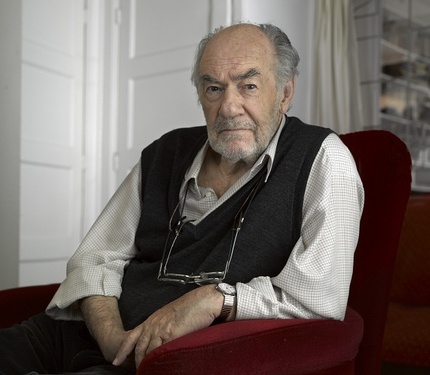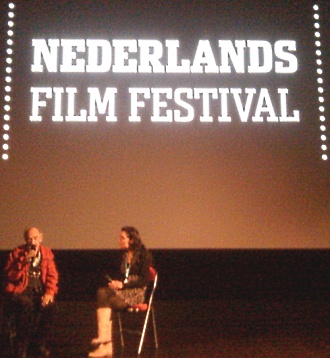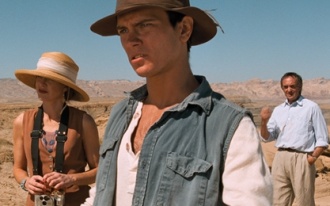DARK BLOOD: A Caustic Yet Warm Q&A With Director George Sluizer

The screening I attended was the first one in front of a general audience, the world premiere open only to crew and industry invitations. I was seated nearby the old man and I really hoped the excitement wouldn't do him in. Thankfully he made it safely to the end and the Q&A turned out to be a hoot. After a long standing ovation which visibly moved him he started talking and he didn't exactly mince his words. This article was supposed to be an added paragraph at the end of the review (found here), but it turned out to be such a treasure trove of information that we've decided to run it separately.
Because there is of course plenty to tell about Dark Blood: This is the film which George Sluizer shot in 1993 but was unable to finish because lead actor River Phoenix died when only 80% of the film was in the can. The version now shown at the Dutch Film Festival is unfinished yet as finished as it will ever be.
George Sluizer has never been particularly shy in his five decades of working in film. He was one of the hands-on producers in Brazil overseeing Werner Herzog's Fitzcarraldo, and anyone on that epic nightmare production must have either lost a few inhibitions along the way, or never had many to begin with. George's replies to questions last evening were to the point, heartfelt and pretty damn unfiltered. Here are some highlights:
 Q: Did you have all sound and music already planned in 1993, or was that added this year?
Q: Did you have all sound and music already planned in 1993, or was that added this year?
George Sluizer: No, when River Phoenix died everything which had to do with the production stopped. The production company was insured against disasters like these so they took the money, and the film ended up in the vault of the insurance company.
Years later, in 2000... no, 1999, that company figured the footage wasn't any use to them and would never get them any money. As the storage was expensive they decided to destroy it, burn it. I heard about this on a Wednesday, while the burning was planned for Friday. I wasn't the producer or the owner, only the director, so I had no rights to the footage. But I knew some guys in Los Angeles so... Well, the night before the footage was going to be destroyed I... From my viewpoint I saved the film, but from everyone else's viewpoint I have ehm... stolen it. (audience laughs and applauds)
Sometimes it's not about rules. Or insurance companies, banks, or money. The best grant I ever got was from a novelist whose short story I wanted to film. Not Dark Blood, another film. I spotted the writer in the street just after I read his story and I walked up to him and said: "Sorry, you don't know me but I am a Dutch movie director, I just read your story and I would love to film it." And he embraced me. That hug was the best gift, the best motivation I've ever got. Not a... a Government grant or official subsidy. Fuck the money! (Audience laughs)
So in 1993 after production stopped there was nothing. We added the music in 2012. It was composed by Florencia Di Concilio. She's from Uruguay and when I heard her music for another film I traveled there to meet her. Even though I cannot really walk (points at his crutches) I did my best to stalk her until she finally relented and said yes.
Q: There are rumors that there was some tension between River Phoenix and Judy Davis on set. Is that true?
George Sluizer: To start with: There was never any tension whatsoever between River Phoenix and me. He was friendly, professional and we had a pleasant time working together. As for Judy, she was a... ehm, I'm looking for a friendlier word here... BITCH!!! (audience laughs)
 I mean, she is a terrific actress, I picked her myself, and she did an excellent job. But she was incredibly difficult to work with, both for me and for River.
I mean, she is a terrific actress, I picked her myself, and she did an excellent job. But she was incredibly difficult to work with, both for me and for River.
Thankfully we had Jonathan Pryce on the set, who was wise or at least mature enough not to get pulled into the fighting. At one point when his character has to yell and curse at her, Judy objected to that. I mean, this was typical: she had read it in the script and had accepted it, but once we were shooting she started to make a fuss, saying she didn't want to be spoken to in such a way. At which point Jonathan said: "Ah, come on Judy, let's keep this in. I only accepted this role because I could act mean to you!" (audience laughs). And that settled it.
I won't allow anyone to speak against her talent as an actress, but if we're talking about her qualities as a human I advise everyone to keep far away from her.
Q: What is the legal status of the film? Will it ever be able to get a regular release?
George Sluizer: The current status is: I have the rights to the film as you saw it this evening, which is why I am allowed to show it as long as no revenue is generated. But the rights to the original negative still need to be sorted out. We hope to get some sort of answer in four or six weeks. But several teams of lawyers have been investigating this for over a year now, so I don't think this will be settled quickly.
You must take into consideration that River Phoenix and the insurance company were from California, the initial production company was British and I am from The Netherlands. That means you already have three different legislators to think of, and three sets of copyright laws you need to juggle. It's an incredible puzzle and very tricky to solve.
Q: Has the rest of the crew seen the film?
George Sluizer: As you could see in the credits it's quite a long list, and some of those people I haven't known that well personally. But many were here on Thursday. Two of the native American actors flew in to see this. Edward Lachman who was the director of photography, some of the producers involved... Unfortunately some people are dead, and Karen Black wanted... you noticed Karen Black in the film? People know her best as the actress opposite Jack Nicholson in Five Easy Pieces, an excellent film. In Dark Blood she plays the motel owner and we've been good friends ever since the 1993 shoot. She wanted to be here for the premiere but unfortunately she has cancer and had to start chemo recently. But she wishes she could have been here and told me to say to the audience that she loves you all.
Q: What was your biggest problem in editing the film together and what are you most proud of?
George Sluizer: I want to say EVERYTHING.(audience laughs).
But because of the way we shot the footage, the film thankfully existed as a series of ready-made building blocks. If you people were able to make something out of watching it, I'm satisfied.
Then again, there is one sequence... the scene where they visit Boy's shelter for the first time, his church almost, and Buffy and Boy are both stoned, and he says he's just a being... I'm very proud of that.
And that ended the Q&A. Many thanks to the Dutch Film Festival for arranging these screenings and assuring me access to them
.
The George Sluizer portrait at the top is (c) Mark Kohn, and its use is approved by the Dutch Film Festival.

Do you feel this content is inappropriate or infringes upon your rights? Click here to report it, or see our DMCA policy.






